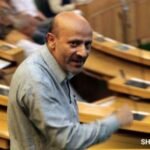While citing the example of his own state, Tamil Nadu Governor R N Ravi on Tuesday criticised the “linguistic division of states”, saying it had created “second-class citizens”.
Speaking at the inauguration of the academic year 2025-26 at the Rashtriya Raksha University (RRU), Gandhinagar, Ravi also praised Operation Sindoor, stating that it would go down in history as an example of “how a country can achieve its political objective through military means in a short, swift manner”, and how, the world over, it was “easy” to start a war but not as simple to end it.
According to Ravi, before Independence, the country was “united” even though there was no single national central government. After Independence, he said, “we have started fighting with each other… what they call linguistic nationalism”.
He said, “Within a decade of our Independence, there had to be a linguistic reorganisation of Bharat and this happened following violent protests in many parts of the country… people had started refusing to live with each other. When we created linguistic states, a large population became second-class citizens…”
He said, “In my own state Tamil Nadu… people of different languages — Telugu, Tamil, Kannada, Gujarati, Marathi, Hindi… they all live together but the moment it became a linguistic state, one third of the population became a second-class citizen. It happened in other parts also.”
The TN Governor said, “Something went wrong after Independence… The rashtra (nation) was taken in a direction that created division among our people in every conceivable way. So much so that the government began accepting as if it was an inevitable natural phenomena. This is reflected in the administrative (reforms) commission report. In 2008, the central government commissioned it. It was a voluminous report on conflict management, countering terrorism and if you read it, you will see how the government viewed the country.”
According to him, the creation of an “ethnicity-based state” was “an attack, an assault on the spirit of Bharat rashtra.”
Story continues below this ad
The Governor said, “Looking at Bharat, the land that celebrated its diversity, every diversity was viewed as a difference… we must remember that the republic of Bharat was born after Independence, but as a rashtra, it has been there for 5,000 years. Unfortunately, after Independence, the consciousness of a rashtra got weakened.”
Governor Ravi praised Prime Minister Narendra Modi for setting up the RRU in 2009, during the latter’s stint as the Gujarat Chief Minister, citing the various terror attack incidents in the country in the preceding years, and said that the institution “has to remain aligned with his (the PM’s) vision.”
‘Until 2014, the entire Northeast was burning’
A former IPS officer who has served in the Intelligence Bureau with assignments in Jammu & Kashmir, the North East and Maoist regions, Governor Ravi said that until 2014 the “entire Northeast was burning” but now it is “far, far near normal”.
“Northeast violence has reduced to insignificance,” he said, crediting the building of infrastructure like new airports, four-lane roads, digital connectivity, Railways and so on.
Story continues below this ad
He said, “Because if you understand the organising principle of rashtra, we will be able to find solutions to our internal security problems in a way that will not create more problems but you will be able to resolve them. Because what we created before the PM came, was (that) in the course of finding solutions, we created more problems.”
Criticising the creation of Nagaland as an “ethnicity-based state”, he said that the violence did not end and the region started getting “vivisected”.
He said, “They created a homeland for Mizos, another for Garo and Khasi in Meghalaya, and even within Assam, there are more than 20 ethnicity-based homelands created under statutory provisions. You kept creating homelands for ethnic groups and within them, there are sub-groups which started fighting. It was like a nuclear reaction. It was a fission reaction. Society started breaking and from a peaceful region, it turned into more than 50 armed organisations.”








